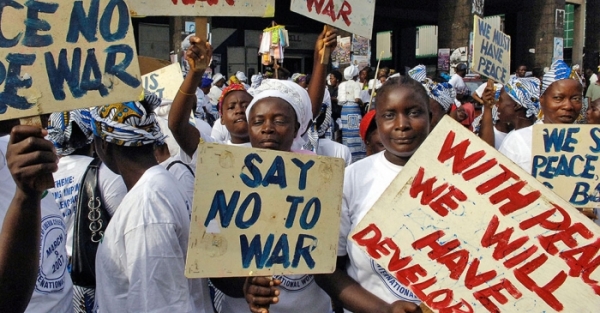1) Women peacebuilders in Syria
Women peacebuilders still face considerable opposition on a global scale, despite the support received from entities such as UN Women and other UN agencies, national authorities and international women’s organisations. Women peacebuilders’ uphill battle for inclusion, both in Syria and globally, is continuously hindered by continued gender-based violence and attacks on humanitarian workers. What is more, only 0.2 per cent of bilateral aid to conflict-affected situations is being directed to women’s organisations.
While conflict in Syria continues, grassroots organisations work to secure peace and ensure that human rights violations are accounted for. An establishment of organisations, such as the Centre for Civil Society and Democracy set up by Syrian women, have pushed for political transition to democracy and highlighted female empowerment as a means to end the conflict. The organisation believes that there is no bright future for Syria without the participation of women in both the peacebuilding and political process. This sentiment is echoed by the UN Secretary-General who believes that “change is coming at a pace that is too slow for the women and girls whose lives depend on it”.
The path to recognition and participation has been extremely difficult, with women facing exclusion from decision-making roles that will shape Syria’s future. Other organisations, like the Syrian Women’s Advisory Board, have pioneered a role for women in the process of peace. Syrian advocates, such as Rajaa Altalli, are bringing together Syrian women of diverse backgrounds to create a peace agenda and work towards achieving its goal. According to the UN, the involvement of women signatories led to a lasting and more sustainable peace as a result of finalising 82 peace agreements, signed to end 42 armed conflicts between 1989 and 2011..
The UN Security Council adopted resolution 2493 in October 2019. The resolution called for the gender and/or women protection advisors to be appointed in post-conflict rebuilding processes to ensure the participation of women. Special attention was given to female participation and protection in elections preparation, disarmament, judicial processes, economic rebuilding and the eradication of poverty.
To know more, please read:
https://reliefweb.int/report/world/power-women-peacebuilders
https://www.unwomen.org/en/news/stories/2019/2/in-the-words-of-rajaa-altalli
2) Women peacebuilders in Bosnia and Herzegovina
During and after the Bosnian civil war, a failure to include people on the ground in peace negotiations reduced the effectiveness of peace processes. Women were especially excluded, which was manifested in a fact that not a single Bosnian woman was present at the signing of the Dayton Peace Agreement in 1995. . Although change has been slow, in the two decades since the bloody Bosnian civil war ended, the role of women as peacebuilders has started to be increasingly recognised. Women have been at the forefront of the remembrance and reconciliation movement and played a vital role in reducing the ethnic and cultural tensions that directly contributed to the conflict.
The lack of involvement women face in peace processes has been observed in conflicts globally. In October 2000, the UN Security Council adopted a resolution 1325 stating that women must be key actors in the peace process and their disproportionate victimisation during war must be recognised in post-conflict reconstruction. However, women still face exclusion. According to the Council on Foreign Relations, between 1992 and 2018, only 13 per cent of negotiators, 3 per cent of mediators, and 4 per cent of signatories in peace processes were women.
Including women in the peace process has demonstrated a positive effect on increasing the sustainability of peace. As UN Secretary-General Antonio Guterres recognised, peace agreements with women signatories are more durable and effective. Simultaneously, peace agreements that exclude women fail to recognise the disproportionate impact that armed conflicts have on women and can lead to continued injustice, even after war has ended.
To know more, please read:
https://www.inclusivesecurity.org/bosnian-women-after-srebrenica-massacre/#home
https://www.cfr.org/report/post-conflict-reconstruction-importance-womens-participation
https://news.un.org/en/story/2019/10/1050151
3) Women peacebuilders in Guatemala
After three decades of conflict in Guatemala ended, 15 women known as “the Abuelas”, brought a ground-breaking case to the highest court of Guatemala. With the support of local organisations and the UN, the women fought for justice and reparations over a four-year legal battle following their horrific experiences during the conflict. The indigenous women were from a small community near the Sepur Zarco outpost. During the 36-year-long Guatemalan civil war, the military was responsible for disappearances and murder of the indigenous men, and the enslavement and sexual abuse of the indigenous women in this area.
The groundbreaking court case was the first of its kind, where national legislation and international criminal law was used to prosecute sexual crimes during a conflict. Although the court convicted two former military officers for crimes against humanity, the Abeulas were seeking justice of a different kind, namely, to ensure a better future for their children and grandchildren.
Reparations, education, land access and measures to lift their community out of poverty have all been a vital component in seeing justice. Civil society organisations have also developed a children’s comic book that details the history of Sepur Zarco, which was distributed among secondary school students across Guatemala. The Abeulas have stated that sharing their story and improving the lives of their community is vital to ensuring that what they lived through is never repeated.
The UN Peacebuilding Fund and UN Women are working with local authorities and organisations to ensure that the sentence delivered in the case of the Abuelas is carried out, and that this transformative legal decision delivers justice for these women and their communities.
To know more, please read:
https://www.unwomen.org/en/news/stories/2018/10/feature-sepur-zarco-case
https://reliefweb.int/report/world/power-women-peacebuilders




